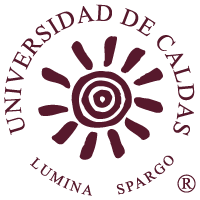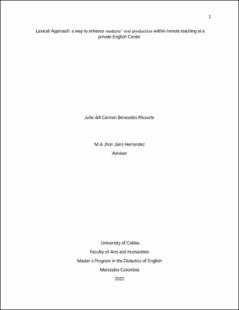Mostrar el registro sencillo del ítem
Lexical Approach: a way to enhance students’ oral production within remote teaching at a private English Center
| dc.contributor.advisor | Hernandez Ballesteros, Jhon Jairo | |
| dc.contributor.author | Benavides Ricaurte, Julie del Carmen | |
| dc.date.accessioned | 2022-09-26T19:48:07Z | |
| dc.date.available | 2022-09-26T19:48:07Z | |
| dc.date.issued | 2022-09-26 | |
| dc.identifier.uri | https://repositorio.ucaldas.edu.co/handle/ucaldas/18092 | |
| dc.description | Ilustraciones | spa |
| dc.description.abstract | spa:Este artículo es un estudio de investigación-acción sobre la implicación del enfoque lingüístico en el desarrollo de la producción oral en un centro de Inglés en el departamento de Nariño. Un curso de 4 estudiantes de nivel pre-intermedio de Inglés participaron en seis diferentes talleres usando el enfoque lingüístico en las planeaciones de clase. Se usaron observaciones de clase, encuesta a estudiantes, observación de profesores y transcripciones orales de los estudiantes como instrumentos principales. Con la implementación de este enfoque, los estudiantes pudieron mejorar la forma de expresarse por ellos mismos. Además, durante la etapa de implementación, los participantes desarrollaron un discurso más coherente integrando expresiones completas de lenguaje en la cual ellos pudieron integrar su propia realidad en diferentes contextos reales y significativos del lenguaje. | spa |
| dc.description.abstract | eng:This action research project points out the Lexical Approach´s implication on the development of oral production at an English center in the department of Nariño. The focus was on the development of oral production in a pre-intermediate EFL English course. The main constructs outline not only the significance of the Input in teaching vocabulary but also the lexis importance in language production through constant reflection upon the implementation of the Lexical Approach teaching workshops. The findings show that the participants of the study made significant progress in terms of some oral production components such as lexical range, accuracy, fluency, and the number of long pauses. Learners could improve the way they express themselves in English. Furthermore, during the action stage, the participants developed a more accurate and confident speech integrating chunks in which they could integrate their own reality in different real meaningful contexts. | eng |
| dc.description.tableofcontents | Introduction / Significance of the Study / 2. Context of the research / 2.1 Description of the Context / 2.2 Description of the Problem / 3. Research Questions and Objectives / 3.1 Research Question / 3.2 Objectives / 3.2.1 Research objectives / 4. Literature Review / 4.1 The Lexical Approach / 4.1.1 Lexis importance / 4.1.2 Classroom Practices / 4.1.3 Collocation in teaching / 4.2 Teaching speaking / 4.2.1 Speaking in the Lexical Approach / 4.2.2 Designing Speaking Activities / 4.3 Remote learning and teaching during the Covid-19 outbreak / 4.4 Review of the research / 5. Methodology / 5.1 Type of study / 5.2 Participants / 5.3 Data Collection Instruments / 5.3.1 Participatory observation / 4 5.3.2 Students’ Surveys / 5.2.3 Teacher’s Interview / 5.2.4 Students’ artifacts / 6. Research stages / 6.1 Diagnostic stage / 6.1.1 Findings and Analysis of the diagnostic stage / 6.2 Action Stage / 6.2 1. Workshops / 6.2.2. Workshops oriented towards oral production development / 6.2.3 Data analysis in the action stage / Workshops 1-2: My last journey – At the travel agent / Workshops 3-4: At the doctor – Renting a place / Workshops 5-6: a job interview – on the media / 6.3 Evaluation stage / 6.3.2 From the analysis and the triangulation of the instruments in each workshop / 7. Findings / 8. Conclusions and pedagogical implications / References / Appendixes / Appendix A: Participatory Observation / Appendix C: Students’ survey / Appendix D: Students’ artifact / Appendix E: Lesson Plan | eng |
| dc.format.mimetype | application/pdf | spa |
| dc.language.iso | eng | spa |
| dc.language.iso | spa | spa |
| dc.title | Lexical Approach: a way to enhance students’ oral production within remote teaching at a private English Center | eng |
| dc.type | Trabajo de grado - Maestría | spa |
| dc.contributor.researchgroup | Lenguas y Discursos (Categoría B) | spa |
| dc.description.degreelevel | Maestría | spa |
| dc.identifier.instname | Universidad de Caldas | spa |
| dc.identifier.reponame | Repositorio Institucional Universidad de Caldas | spa |
| dc.identifier.repourl | https://repositorio.ucaldas.edu.co/ | spa |
| dc.publisher.faculty | Facultad de Artes y Humanidades | spa |
| dc.publisher.place | Manizales | spa |
| dc.relation.references | Boers, F., Eyckmans, J., Kappel, J., Stengers, H., and Demecheleer, M. (2006). Formulaic sequences and perceived oral proficiency: putting a Lexical Approach to the test. Edward Arnold (Publishers) Ltd, 10(3), 245-261. | spa |
| dc.relation.references | Brown, H.D. (2007). Teaching by Principles, Pearson Education, Inc. Littlewood, W. (1981) Communicative Language Teaching, Cambridge University Press | spa |
| dc.relation.references | Bygate, M. (1987). How do Learners learn to Speak a Foreign Language. Oxford: Oxford University Press. | spa |
| dc.relation.references | Cardenas-Claros, M., and Oyanedel, M. (2015). Teachers’ implicit theories and use of ICTs in the language classroom. Technology, Pedagogy and Education, 25(2), 207–225 | spa |
| dc.relation.references | Celce-Murcia, M. (2001). Teaching English as a Second or Foreign Language (3rd Ed.). Boston, MA: Heinle & Heinle. | spa |
| dc.relation.references | Cortina, B. (2009). Una propuesta didáctica para la mejora de la competencia conversacional de una LE mediante secuencias formulaicas. Didáctica, Lengua y Literatura, 1(21), 99-115 | spa |
| dc.relation.references | Creswell, J (2016). 30 Essential Skills for the Qualitative Research. Sage, Los Angeles. | spa |
| dc.relation.references | Delar, H. & Walkley, A. (2016). Teaching Lexically principles and practice. England: Delta Publishing. | spa |
| dc.relation.references | European Common Framework. The copyright belongs to the Council of Europe. The Common European Framework of Reference for Languages is published in English by Cambridge University Press. | spa |
| dc.relation.references | Glaser, B and Strauss, A (1999) The Constant Comparative Method of Qualitative Analysis. The Discovery of Grounded Theory: Strategies for Qualitative Research. Hawthorn, New York. | spa |
| dc.relation.references | Harmer, J. (2007). The practice of English Language Teaching (New edition). Essex: Pearson Longman. | spa |
| dc.relation.references | Kemmis, S. and McTaggart, R. (2005). Participatory action research. Australia: Retrieved from: http://www.infor.uva.es/~amartine/MASUP/Kemmis_2007.pdf | spa |
| dc.relation.references | Krashen, S. (1989). We Acquire Vocabulary and Spelling by Reading: Additional Evidence for the Input Hypothesis. The Modern Language Journal, 73(4), 440-464. | spa |
| dc.relation.references | Kweldju, S. (2005). Lexically-based language teaching: metaphor for enhancing learning. Indonesian journal of English language teaching, 1(2), 52-65. | spa |
| dc.relation.references | Lackman, K. (2010). Lexical Approach activities a Revolutionary way of Teaching. Ken Lackman & Associates Educational Consultants. | spa |
| dc.relation.references | Lewis, M. (2000). Teaching Collocations further developments in the Lexical Approach. London: Heinle Cengage Learning. | spa |
| dc.relation.references | Lewis, M. (2000). The Lexical Approach the state of ELT and a way forward. Heinle: Cengage Learning. | spa |
| dc.relation.references | Lewis, M. (2008). Implementing the Lexical Approach putting Theory into practice. Heinle: Cengage Learning. | spa |
| dc.relation.references | Marchlik, P., Wichrowska, K., and Zubala, E. (2021). The use of ICT by ESL teachers working with young learners during the early COVID-19 pandemic in Poland. Education and Information Technologies, 26, 7107–7131. | spa |
| dc.relation.references | Mckay, S. (2006). Researching Second Language Classrooms. Lawrence Earlbaum Associates, London. | spa |
| dc.relation.references | Moon, R. (2010). What can a corpus tell us about lexis? Routledge, Taylor & Francis Group, 1(15), 197-211. | spa |
| dc.relation.references | Parsons, R.D., & Brown, K.S. (2002). Teacher as reflective practitioner and action researcher. Belmont, California: Retrieved from: http://www.nctm.org/uploadedFiles/Lessons_and_Resources/Grants_and_Awards/How%20is %20Action%20Research%20Defined (1).pdf. | spa |
| dc.relation.references | Racine, J. (2018). Lexical Approach, Edited by Jhon L. The TESOL encyclopedia of English Language teaching, 1(2), 1-7. | spa |
| dc.relation.references | Revelo, J. (2019). The positive effects of using the Lexical Approach for kids at learning English. Huellas journal, 1(11), 1-6. | spa |
| dc.relation.references | Richard, J. & Rodgers, T. (2001). Approaches and Methods in Language Teaching (2nd Ed.). New York: Cambridge University Press. | spa |
| dc.relation.references | Smith, N. (2007). Current perspectives on vocabulary teaching and learning. Research gate, 8(55), 827-841. | spa |
| dc.relation.references | Scheffler, P. (2015). Lexical priming and explicit grammar in foreign language instruction. ELT Journal, 69(1), 93-96. | spa |
| dc.relation.references | Sewbihon-Getie, A. (2020). The Effectiveness of Using the Lexical Approach to Developing Ethiopian EFL Learners’ Vocabulary Competence. How journal, 28(1), 69-93. | spa |
| dc.relation.references | Thornbury, S. (1998). The Lexical Approach. A Journey Without Maps?, 7(4), 7-13 | spa |
| dc.relation.references | Torres, A. (2012). The Lexical Approach: collocability, fluency and implications for teaching. Revista de lenguas para Fines Específicos, 1(18), 237-254. | spa |
| dc.relation.references | Ur, P. (1996). A Course in Language Teaching: Practice and Theory. Cambridge: Cambridge University Press. | spa |
| dc.relation.references | Willis, D. (1990). The Lexical syllabus: a new approach to language teaching. Collins ELT Cobuild. | spa |
| dc.relation.references | Wray, A. (2002). Formulaic Language and the Lexicon. New York: Cambridge University Press. | spa |
| dc.relation.references | Ziafar, M. & Namaziandost, E. (2019). Linguistics, SLA, and Lexicon as the Unit of Language. IJLLT, 2(5), 245-250. | spa |
| dc.rights.accessrights | info:eu-repo/semantics/openAccess | spa |
| dc.rights.accessrights | info:eu-repo/semantics/openAccess | spa |
| dc.rights.accessrights | info:eu-repo/semantics/openAccess | spa |
| dc.rights.accessrights | info:eu-repo/semantics/openAccess | spa |
| dc.subject.proposal | Language input | eng |
| dc.subject.proposal | Lexical approach | eng |
| dc.subject.proposal | Lexis range | eng |
| dc.subject.proposal | Oral fluency | eng |
| dc.subject.unesco | Lingüística | |
| dc.subject.unesco | Expresión oral | |
| dc.type.coar | http://purl.org/coar/resource_type/c_bdcc | spa |
| dc.type.content | Text | spa |
| dc.type.driver | info:eu-repo/semantics/masterThesis | spa |
| dc.type.version | info:eu-repo/semantics/publishedVersion | spa |
| oaire.version | http://purl.org/coar/version/c_ab4af688f83e57aa | spa |
| oaire.accessrights | http://purl.org/coar/access_right/c_abf2 | spa |
| dc.description.degreename | Magister en Didáctica del Inglés - Manizales | spa |
| dc.publisher.program | Maestría en Didáctica del Inglés - Manizales | spa |
| dc.rights.coar | http://purl.org/coar/access_right/c_abf2 | spa |







